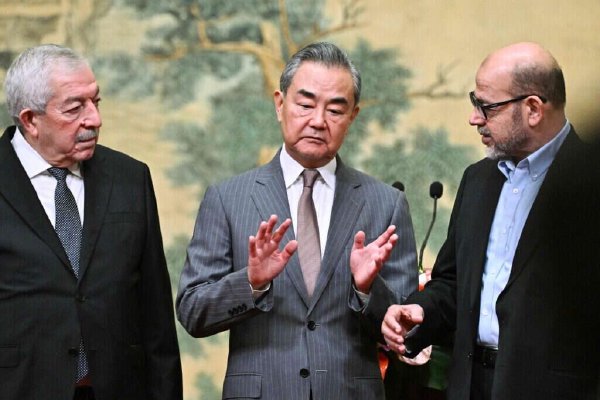China’s Delicate Dance in the Middle East#
The recent Israel-Iran conflict, which flared between June 13-24, 2025, put China’s foreign policy to the test, exposing the intricate balance Beijing seeks to maintain in the volatile Middle East. While official statements called for de-escalation and condemned Israeli actions, a deeper look reveals a pragmatic approach driven by economic interests and a desire for regional stability rather than ideological alignment.
This article synthesizes information and analysis, with primary source material compiled from reporting by Discourse Power on Substack1.
Official Stance vs. Nationalist Echoes#
China’s diplomatic rhetoric, led by figures like Foreign Minister Wang Yi and UN Ambassador Fu Cong, consistently emphasized respect for sovereignty and international law, urging both sides to cease hostilities. This “active non-alignment,” as some analysts describe it, allows China to position itself as a responsible global actor. However, the narrative adopted by state-affiliated media and influential nationalist voices, such as former Global Times editor Hu Xijin, offered a more nuanced and at times subtly pro-Iran perspective. While officially condemning violence, these outlets often framed Israel as the aggressor, subtly downplaying Iran’s role in regional destabilization and its nuclear ambitions. This dual approach grants Beijing flexibility: a seemingly neutral official posture for international consumption, alongside a more assertive, anti-Western undertone for domestic audiences and sympathetic partners.
Strategic Pragmatism: Beyond the “Axis of Evil”#
Despite a “comprehensive strategic partnership” with Iran, China’s response to the conflict highlighted its instrumental, rather than ideological, approach. Beijing offered no military aid or direct support to Tehran, signaling that its alliances are built on transactional benefits rather than unwavering solidarity. This calculus prioritizes China’s broader strategic goals, particularly avoiding direct confrontation with the United States and securing its economic interests. The idea of an “Axis of Evil” or a rigid anti-Western alliance between China, Russia, and Iran appears to be more rhetoric than reality; Beijing’s actions during the conflict underscore a preference for maintaining flexibility and leveraging crises for economic advantage.
Impact on Middle East Ambitions and Economic Lifelines#
The conflict undeniably complicated China’s carefully cultivated relationships in the Middle East. While Beijing has invested heavily in diplomatic and economic ties across the region, its condemnation of Israel risks straining relations with Jerusalem. This underscores the challenge China faces in its ambition to be a major player in the Middle East without taking definitive sides in its complex rivalries.
Economically, the war had direct implications for China’s energy security. As Iran’s largest oil purchaser, China has a vested interest in regional stability and uninterrupted supply chains. The conflict, unexpectedly, presented an opportunity for China to continue purchasing Iranian oil with reduced sanctions risks post-ceasefire, validating previously ambiguous transactions. This reflects China’s consistent strategy of prioritizing economic interests, using its influence to secure resources and market access rather than engaging in costly political interventions. Initiatives like the Belt and Road, while aiming to expand China’s influence, cannot alone guarantee regional stability, highlighting the limits of economic power in complex geopolitical landscapes.
A Quest for Stability in a Shifting Landscape#
Ultimately, China’s reaction to the Israel-Iran conflict underscores a deep-seated desire for stability in the Middle East, albeit on its own terms. Its cautious approach reflects an understanding that direct military entanglement or overtly partisan stances could jeopardize its long-term economic and strategic interests. While Beijing seeks to project an image of a responsible global power, its actions reveal a pragmatic focus on its own economic well-being and a reluctance to fully commit to any single regional power, including its partners.
The aftermath of the conflict will continue to test China’s balancing act. As the Middle East remains a crucible of geopolitical tensions, Beijing’s ability to navigate these complexities, maintain its economic lifelines, and advance its influence without being drawn into direct conflict will determine the success of its ambitious regional strategy. Its calculated silence and emphasis on de-escalation are not signs of weakness, but rather a reflection of a carefully considered foreign policy aimed at securing its future prosperity.
Tuvia Gering, "China Reacts to Israel-Iran War: Compilation", Discourse Power, June 17, 2025. ↩︎





